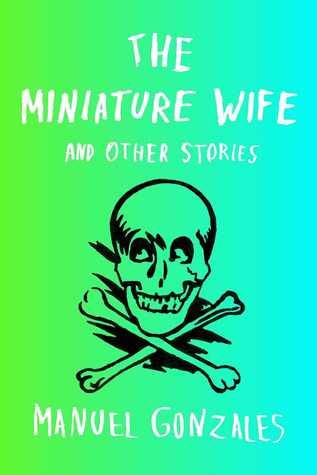
by: Manuel Gonzales
genre: short stories (speculative fiction/science fiction)
pages: 304
published: January 2013
source: I received an advanced reader's copy from Riverhead via LibraryThing in exchange for an honest review.
Manuel Gonzales' first collection of short stories was a truly unique but quick read. Ranging from the speculative to the supernatural, Gonzales' subject matter ranged from plane hijackings to zombie attacks, but to varied levels of success.
Some highlights:
- Pilot, Copilot, Writer: The premise: the main character, a writer, is on a plane that is hijacked. Instead of the hijacker holding the passengers for ransom or rerouting the plane to a different location, the hijacker chooses to circle Dallas. For about twenty years. Now, the premise alone presents so many obstacles and creates so many parameters for a writer, but Gonzales manages to shatter them and creates a truly original piece. One of the strongest pieces in the collection.
- The Disappearance of the Sebali Tribe: Brilliant! Love love LOVED this story. The premise: Two anthropologists almost pull of a hugely successful hoax on academia: they publish study after groundbreaking study on a deeply isolated tribe THAT DOESN'T EXIST. Superbly woven together. Tight, purposeful plot structure. Bravo :)
Almost there:
- All of Me: The first of two (TWO!) zombie-centric stories in the collection, this piece is from the perspective of a zombie, disguised as the very much alive, going about his nine-to-five life, trying to resist the urge to eat the faces of his coworkers. He also has a crush on a female coworker. The voice is incredibly original and very funny, though I feel like the plot devolved from something super original to something super expected.
Skip these:
- Life on Capra II: The voice Gonzales employed for the main character in this piece really didn't work for me. He felt more like a caricature than a character, and maybe that was the point. There was a distinctly video-game-esque feel to the piece, as the action seems to progress, then regress, as if player one lost and the game reset to the beginning of the level, and the reader was inside the brain of the avatar. Regardless, the voice was just so over the top at times that made it hard for me to care about him or what happened to him. Then there were the guns. And the robot attacks. And the swamp monsters. It just got to be a little much. I'm the wrong kind of nerd to appreciate that story.
- Escape from the Mall: A story about a group of people trapped in a janitor's supply closet during a spontaneous zombie uprising at their local mall. I feel like, even if you're not into horror/zombie movies, we've all seen this movie. Over the past 3-5 years as pop culture became obsessed with all things zombie , this plotline somehow found its way into America's collective unconscious. When I first started the story, I was excited. I thought Gonzalez was going to do something really original with this very done premise. Nope. Personally, I feel like Gonzales took such creative risks and thought so outside the box for many of the other stories in this collection that this story just felt too easy. It was a great starting point, but I feel like if, as an author, you choose to take on a premise that's been done to death, you better bring something original to the table, and unfortunately, in this case, Gonzales does not.
My personal feeling: Gonzales shines when he sticks to more to the realm of speculative (particularly when the speculative topics delve into academic topics...it's clear Gonzales is, himself, super intelligent and very well read!) but struggles when he veers to far into the land of science fiction. All in all, some blazing moments of brilliance tucked in between pieces with potential to be developed into something worth reading. Definitely worth checking out from your local library.
Rubric rating: 5.5.












